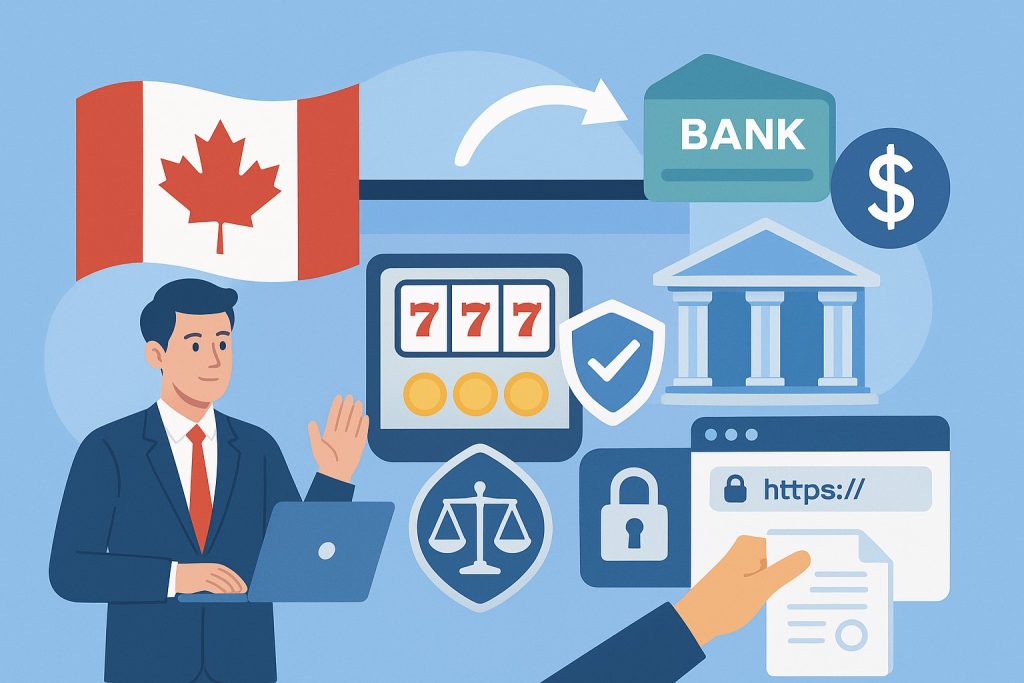If you are thinking about trying online casino gaming in Canada, one of the first things on your mind is probably: ‘Is my money really safe?’ And that is a totally fair question. After all, you are talking about sending your hard-earned cash to a digital platform, and you want to be sure it won’t disappear into thin air.
The good news? When you play at a licensed Canadian online casino and use a bank transfer, your money is generally very well protected. The country has a strong regulatory system in place that keeps online gambling secure and fair, and bank transfers happen to be one of the safest ways to deposit and withdraw funds.
When it comes to finding trustworthy casinos that accept bank transfers in Canada, BankTransferCasino.ca is an excellent resource. This website specializes in listing licensed casinos operating in Canada that specifically offer bank transfer payments, helping players navigate the casino world and find operators they can genuinely trust.
Why Bank Transfers Are One of the Safest Payment Methods
When you make a bank transfer deposit at a licensed Canadian casino, you are using the most heavily regulated financial channel available. Here’s what’s happening on the backend that makes it so secure:
1. Your bank is actively protecting you
When you start a transfer to a casino, the bank’s fraud detection systems spring into action. Canadian banks use sophisticated algorithms and real-time transaction monitoring to identify suspicious activity instantly.
Banks have invested heavily in cybersecurity to catch fraudulent attempts before they impact your account. This multi-layered protection happens automatically every time you make a transfer.
2. Every transaction is permanently recorded
Every transfer leaves a digital trail that can be traced, audited, and verified. This is why regulators love them; they make it nearly impossible for casinos to disappear with player funds without detection. The transaction is recorded on both your bank’s system and the casino’s acquiring bank.
3. Money moves directly between verified accounts.
Unlike credit cards or e-wallets, which can involve multiple intermediaries, bank transfers go directly from your account to the casino’s merchant account. Both accounts have been verified and documented. This direct connection means fewer moving parts and fewer opportunities for fraud or theft.
How Licensed Casinos Protect Your Deposits
Licensed Canadian online casinos don’t just accept your money; they are required by law to protect it. These are not polite suggestions from regulators; they are mandatory requirements for keeping a license.
Most regulated casinos use SSL encryption for their websites, the same technology used by banks. This means when you’re entering your banking information or making a transfer, it’s encrypted end-to-end.
Additionally, licensed casinos must segregate player funds from operational funds. This means your money can’t be mixed in with the casino’s business account. If a casino faces financial difficulties, your deposits are protected in a separate account that creditors can’t touch.
This is why regulated online casinos have become the go-to choice for Ontario players. A study by the Alcohol and Gaming Commission of Ontario found that over 86% of Ontario’s online players actively choose to play on regulated sites rather than unregulated alternatives. Players clearly understand the difference that regulatory oversight makes. When you use an established operator, you are choosing a platform that is actually held accountable.
Understanding Your Rights When You Deposit
When you send money to a licensed Canadian casino, you are not just hoping for the best. Most gambling commissions have published player protection codes that outline your specific rights. These typically include the right to accurate information about odds and game volatility, the right to set deposit limits and cooling-off periods, and the right to self-exclude if you feel your gambling is becoming problematic.
For credible and comprehensive information on player rights and responsible gambling practices in Canada, the Responsible Gambling Council provides excellent resources and data-backed guidance. They track responsible gambling initiatives across the country and publish research on how effective player protection measures actually are.
Why Withdrawals Take Longer
Here’s something that catches players off guard: when you want to cash out your winnings via bank transfer, it can take considerably longer than it would to make a deposit.
But before you get frustrated, understand what’s happening behind the scenes, and why this delay is actually protecting you and your winnings.
Only after these checks does the casino’s payment processor actually release your funds to the bank. The speed sacrifice at licensed Canadian casinos buys you reassurance that your money is safe.
Red Flags to Watch For
Despite Canada’s strong regulatory environment, not every online casino you’ll encounter is legitimate. Here are some warning signs that should make you hesitant:
The Bottom Line of Security
Canada’s regulatory framework has fundamentally changed what it means to gamble online safely. You’re no longer taking a leap of faith when you deposit at a licensed operator; you’re entering a system backed by strict oversight and protections.
Security isn’t a single feature; it’s a system that works when all the pieces are in place: a licensed casino, regulated banking channels, and your own awareness of red flags.





















